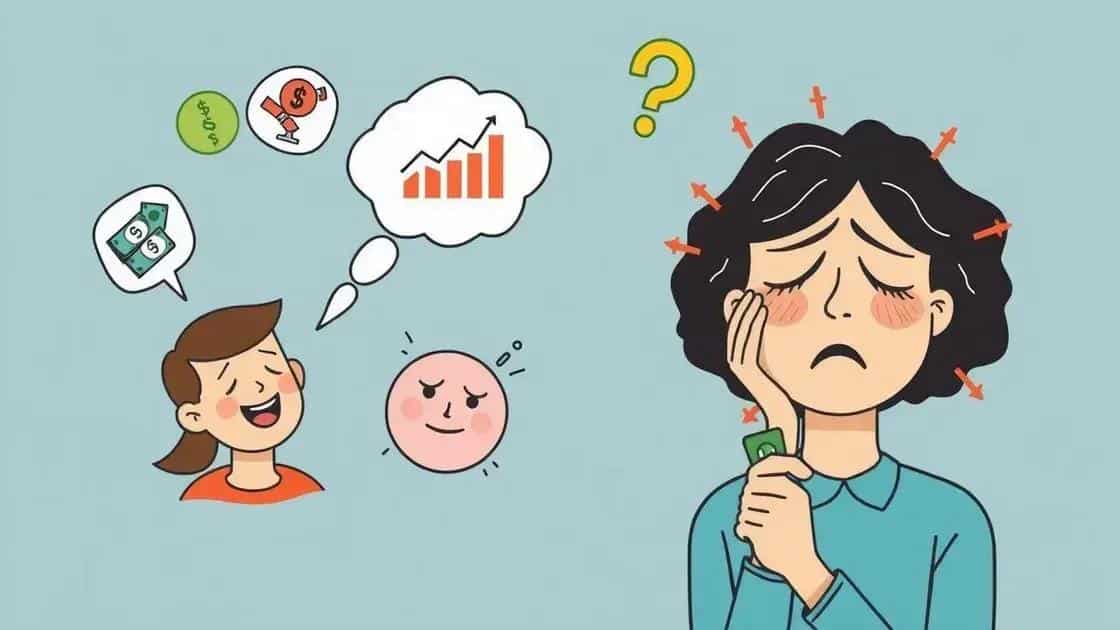Money psychology: how 20 minutes can change your mindset

Understanding how emotions influence financial decisions is crucial, as feelings like fear and excitement can drive impulsive spending or cautious saving, impacting overall financial health.
Money psychology is a fascinating field that explores how our thoughts and feelings about money shape our financial behaviors. Have you ever wondered how a small change can lead to big results? Let’s dive into this intriguing topic and see how just 20 minutes can transform your mindset.
Understanding money psychology
Understanding money psychology is vital for anyone looking to improve their financial habits. It dives deep into the reasons behind our financial behaviors. Why do we spend impulsively? Why do we hesitate to save? Let’s explore these questions.
The basics of money psychology
At the core, money psychology examines how our emotions and thoughts shape our decisions about money. For instance, an individual might feel joy when spending money or anxiety when faced with bills. Recognizing these feelings often leads to better financial choices.
Key factors influencing our views on money
- Childhood experiences: Our early interactions with money can greatly affect our financial habits later in life.
- Cultural influences: Different cultures view money in various ways, influencing individual attitudes toward saving and spending.
- Social circles: The financial behaviors of friends and family can shape our approach to money, sometimes leading us to spend more to keep up.
Understanding these influences is crucial for making positive changes. For instance, if someone grew up in a household that emphasized saving, they may be more inclined to save than someone raised with different values. By being aware of these factors, we can work towards improving our financial literacy.
Another important aspect is how emotions can lead to financial mistakes. Emotional spending, where purchases are made based on feelings rather than needs, can lead to debt and regret. Identifying emotional triggers can empower individuals to make more rational choices.
As we continue to unpack money psychology, consider asking yourself questions like, “What emotions do I feel when budgeting?” or “How do my friends influence my spending?” These reflections can offer great insights into your personal money habits and lead to substantial improvements.
The impact of 20 minutes on your financial habits

The impact of 20 minutes on your financial habits is significant and can lead to lasting changes. Just spending a short amount of time focused on your financial goals can reshape your approach to money management.
Quick financial assessments
Taking just 20 minutes to review your finances can clarify where you stand. This can involve checking your bank statements or evaluating your spending habits. By regularly examining your financial situation, you gain a better understanding of your expenses. This insight allows for better planning and smarter decisions.
Setting clear financial goals
In 20 minutes, you can outline specific savings or investment goals. When you set clear targets, you’re more likely to achieve them. Write down your goals, whether it’s saving for a vacation, paying off debt, or starting an emergency fund. Having these goals visible can motivate you to make conscious and responsible financial choices.
- Create a budget: Allocate money for essentials, savings, and leisure activities.
- Track your spending: Identify unnecessary expenses that can be reduced.
- Review subscriptions: Cancel unused services to free up cash.
Sometimes, the most straightforward actions bring the most significant changes. For example, just by spending those 20 minutes to tweak your budget, you might find ways to save more effectively. A quick review session can help identify which expenses are valuable and which are simply drains on your resources.
Incorporating these 20-minute habits into your routine leads to better long-term financial health. By being consistent, you’ll notice changes over time. This practice can also reduce stress, allowing you to feel more in control of your financial situation.
Practical tips for changing your money mindset
Practical tips for changing your money mindset can make a big difference in how you interact with your finances. Small adjustments in your thoughts can lead to significant improvements in your financial health.
Identify your money beliefs
The first step is recognizing your current beliefs about money. Are they positive or negative? Understanding these beliefs helps you figure out what needs to change. Ask yourself questions like, “Do I view money as a tool or a source of stress?” and reflect on how these feelings shape your habits.
Shift to a growth mindset
Embracing a growth mindset can alter your financial outlook. Instead of thinking, “I will never have enough money,” try reframing it to, “I can learn how to manage my money better.” This shift encourages learning and growth, rather than defeat.
- Practice gratitude: Regularly write down things you are grateful for, including financial blessings.
- Educate yourself: Take time to learn about budgeting, saving, and investing.
- Visualize your goals: Create a vision board to keep your financial goals in sight.
Implementing these practical tips regularly can slowly help you build a healthier relationship with money. Each small step counts. You might consider setting a weekly goal to track your spending or savings. This act not only manages your finances more effectively but also reinforces your positive beliefs.
Remember, changing your money mindset is a process. Be kind to yourself as you learn. Celebrating small wins can motivate you to keep pushing forward. As you become more comfortable with your finances, you’ll likely notice how these changes positively affect other areas of your life.
How emotions influence financial decisions

How emotions influence financial decisions is a crucial topic in understanding our financial behavior. Emotions play a significant role when it comes to spending, saving, and investing.
Understanding emotional triggers
Our feelings often dictate how we handle money. For instance, stress can lead to impulsive spending, while happiness may inspire saving for the future. Recognizing these emotional triggers helps us make more mindful choices.
The impact of fear and anxiety
Fear and anxiety about financial security can lead to conservative spending habits. When individuals are afraid of losing money, they may avoid investments altogether, missing out on potentially profitable opportunities. This kind of emotion can trap a person in a cycle of worry, making it harder to thrive financially.
- Fear of loss: This can make people overly cautious, impacting their ability to invest.
- Guilt: Some may feel guilty when spending money on themselves, leading to deprivation.
- Excitement: On the flip side, excitement can lead to impulsive purchases without considering budget constraints.
Moreover, positive emotions can boost financial confidence. When people feel secure and happy, they are usually more willing to take calculated risks. This can result in lucrative investments or beneficial financial decisions. Understanding how emotions intertwine with financial behaviors can empower individuals to make better choices.
It’s essential to develop strategies to manage these emotions effectively. For example, engaging in mindful spending practices can help clear emotional clouds that may distort our financial judgment. Taking time to reflect before making a decision can serve as a powerful tool in navigating these feelings.
FAQ – Frequently Asked Questions about Emotions and Financial Decisions
How can emotions affect my spending habits?
Emotions such as stress or excitement can lead to impulsive spending or cautious saving. Recognizing these feelings helps in making better financial choices.
What are some strategies to manage financial anxiety?
Practicing mindfulness, setting clear financial goals, and reflecting before making purchases can help manage anxiety related to finances.
Why is it important to recognize financial triggers?
Understanding your emotional triggers can help you identify patterns in your spending, leading to more informed and healthier financial decisions.
How can I develop a positive money mindset?
By shifting your perspective on money, actively practicing gratitude, and celebrating small financial wins, you can foster a healthier relationship with your finances.





